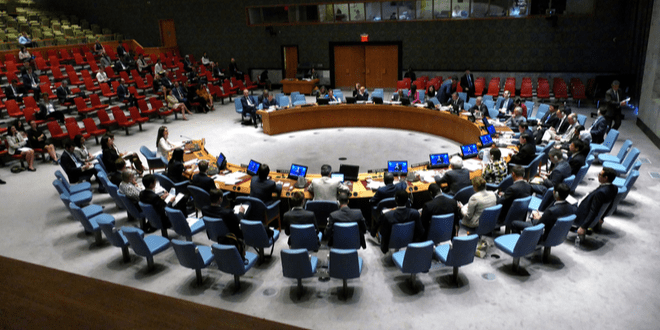The United States’ vote to abstain earlier this month on a draft United Nations resolution involving Palestinian refugees and their descendants set off discomfort in Israel over Washington’s policy regarding one of the most sensitive topics in the Israeli-Palestinian conflict.
During the Nov. 9 meeting, the U.N.’s Fourth Committee passed the resolution, which, among other things, affirmed support for the continued work of the United Nations Relief and Works Agency for Palestine Refugees in the Near East (known as UNRWA). It called on Israel to “cease obstruction of the Agency’s work” and affirmed that “Palestine refugees are entitled to their property and income derived from it.” It urged “the two sides to deal with property rights in the final stage of negotiations.”
The resolution comes up every three years. The U.S. abstaining was a marked departure in policy – all previous American administrations except the Obama administration have voted against this resolution.
In explaining the abstention, Ambassador Richard Mills, the deputy U.S. representative to the United Nations, stated that Washington was “pleased to see language included in several of the resolutions that reflect our priorities in line with strengthening UNRWA. This language puts a stronger onus on the Agency and on UN leadership to demonstrate a renewed commitment to the humanitarian principles of neutrality, independence, and impartiality, as well as provides a basis for strengthened agency oversight.”
The U.S. also voted against several additional resolutions that singled out Israel: “We are disappointed that Member States continue to disproportionally single out Israel,” Mills said. “For this reason, the United States strongly opposes the annual submission of a package of resolutions biased against Israel.”
In contrast, the Clinton administration’s representative voted against such the refugee resolution in 1999, saying the U.S. “could not support unbalanced resolutions which attempted to prejudge the outcome of negotiations; lasting peace would come from agreements reached among the parties themselves, not from any action taken by the Committee.”
Contrary to several media reports, the U.N. resolution did not call for a so-called Palestinian “right of return,” but it did touch on the explosive issue of what the U.N. considers to be Palestinian refugees – some 5.7 million people – in ways that are decidedly unbalanced from an Israeli perspective.
In April, Secretary of State Antony Blinken announced the resumption of $150 million in annual American financial assistance to UNRWA in its areas of operation in the West Bank and the Gaza Strip, as well as Lebanon, Jordan, and Syria.
The Trump administration froze the assistance in 2018 after concluding “that this assistance perpetuates and even broadens the Palestinian problem, and fails to deal with it in the right way, which could involve solutions to the refugee issue, not keeping it alive indefinitely,” Col. (res.) David Hacham, a former Arab-affairs adviser to Israeli defense ministers, and a senior research associate at the Miryam Institute, told the Investigative Project on Terrorism.
Solutions would include settling the refugees and their descendants where they currently live, compensation, and opening “a new page in Israeli-Palestinian relations.”
“The ‘right of return’ of the refugees is one of the three core principles within the Palestinian perspective in their conflict with Israel,” Hacham said.
“It is a central issue in the PLO’s engagements with Israel. There is no division between Hamas and Fatah on the unequivocal call for a ‘right of return,'” Hacham noted. With a “right of return,” Palestinians living throughout the world – but still considered refugees – could return to what is now Israel. That “would be the destruction of Israel as a Jewish state. Accepting this call is national suicide for Israel as a democratic Jewish state.”
While Fatah uses this call as part of its maneuvering in negotiations with Israel, Hamas uses it as a rallying call in its active war against Israel for the purpose of destroying it.
Both Hamas and Fatah have turned the “right of return” into a pillar of Palestinian education and identity, Hacham said. “It’s at the core of the conflict. As an issue, it is still alive, bubbling, influential, filled with emotional baggage, with geographic, historical and nostalgic significance.”
Hacham recalled asking Gazan youths, when he was stationed in the Strip during his military service, where they were from. “They didn’t say Jabaliya or Rafah [Gazan regions], they’d say Ashkelon, Haifa, and Jaffa [cities in Israel],” he said. “They keep a key to their original homes to this day, as a symbol of their aspiration to return when they can.”
Unique, perpetual status
The issue of Palestinian refugees has been cynically used by Israel’s adversaries for decades, exploiting “layers of ignorance laced with ill intent towards Israel” to keep the issue alive and relevant, and to use it as a stick to beat Israel with.
“Only a small percentage” of the 5 million people registered by UNRWA today as refugees “are original inhabitants of Mandatory Palestine [the League of Nations entity ruled by Britain until Israel’s Independence in 1948],” Hacham said.
According to various estimates, between 720,000 to 850,000 people left at that time, fleeing a war that was sparked by the invasion of multiple Arab armies against the nascent Jewish state.
More than 850,000 Jews from Muslim countries were forced to flee from their homes, most of them settling in Israel, and arriving with nothing. They were absorbed in Israel in transitional refugee camps in poor conditions until their eventual absorption. “I was born in such a camp myself, after my parents were forced to leave without any property from Baghdad in 1951,” Hacham said. While the Jewish refugees were successfully absorbed with time, the Palestinian and Arab leadership deliberately rejected the absorption of the Palestinian refugees in order to safeguard the issue as a propaganda weapon against Israel.
“The historical background is the 1948 War of Independence, and the invasion attempt, which was aimed at destroying Israel,” said Hacham. “Arab armies boasted of a rapid victory and called on Palestinians to leave their homes, promising them a quick return. Some also fled because of pinpoint Israeli activity in their areas and military pressure. There was a mass Palestinian escape from the new state of Israel,” he said.
UNRWA, established in 1949, is the only U.N. refugee agency established to deal exclusively with Palestinian refugees (all other refugees in the world fall under the mandate of the United Nations High Commissioner for Refugees – UNHCR). In 1951, UNRWA ruled that the descendants of Palestinian fathers who were members of the refugee camp will also count as registered refugees, and since then the numbers of those classed in this group have kept growing. UNRWA’s mandate is renewed by the U.N. every three years.
In Gaza, Palestinian refugees and their descendants today form the majority of the population, although when they first arrived in the Strip, they faced varying degrees of alienation and struggled to climb the social ladder, said Hacham. Hamas’s founding leadership is mostly made up of operatives from this community, such as Hamas co-founder Sheikh Ahmad Yassin.
Several Arab states, such as Lebanon, denied citizenship to Palestinian refugees, and passed discriminatory laws banning them from working in more than 20 professions. Jordan is the only country to grant them citizenship en masse.
Today, Hamas and Fatah both espouse what Hacham described as “maximalist, unequivocal positions on the right of return.”
In addition, he said, the issue is an inseparable component of routine Palestinian incitement against Israel’s very existence. “The refugees form both a symbolic and practical expression of the conflict with Israel.”
UNRWA requires substantial changes
Israel has been critical of several aspects of UNRWA’s operation, said Hacham, and views it as an agency “that does not contribute to solving the issue, but rather, perpetuates it. As a result, Israel believes that a return of financial assistance requires substantial change in UNRWA’s character, objectives, and modus operandi.”
Urgent improvements include the need for better supervision of the anti-Israel and anti-Semitic incitement that takes place in UNRWA’s facilities, he said.
“Hamas uses UNRWA and its schools to incite against Israel,” he added. “School textbooks contain nationalistic texts and calls for a right of return. There is no presentation of a realistic peace, and in some cases, there is even education towards jihad. After criticisms, UNRWA decreased some of this incitement, but it is still there, including problematic statements praising terrorism.”
“Its sites are also used for terrorism, such as the smuggling of weapons in UNRWA ambulances during the Second Intifada, meetings of Tanzim [the armed wing of Fatah] terrorists in UNRWA facilities in the West Bank, and more recently, the firing of rockets from UNRWA schools in Gaza during rounds of conflict,” said Hacham.
In 2021, following Operation Guardian of the Walls against Hamas, evidence emerged of Hamas combat tunnels dug under an UNRWA school.
UNRWA’s chief Matthias Schmale faced fierce criticisms from the ruling Hamas regime when he acknowledged that Israeli air strikes were precise, he and an apology soon appeared. In June, Schmale was recalled from Gaza to East Jerusalem following threats. Now, he has been removed from his post.
Meanwhile, in places like Lebanon, Hacham said, the services that UNRWA provides to Palestinians, such as education and employment, create resentment among local citizens who do not receive such services.
Ultimately, unlike other conflicts that created refugees, including the Second World War which left millions of refugees in its wake – all of whom were resettled within a decade – the “Palestinian leadership safeguards Palestinian refugees as a permanent festering problem,” said Hacham.
“This issue has been accompanying us for 73 years – more than three generations – and it will continue to accompany us until a political arrangement is reached,” he said, something that is today not on the horizon as a realistic scenario.”
Reprinted with author’s permission from The Investigative Project on Terrorism





